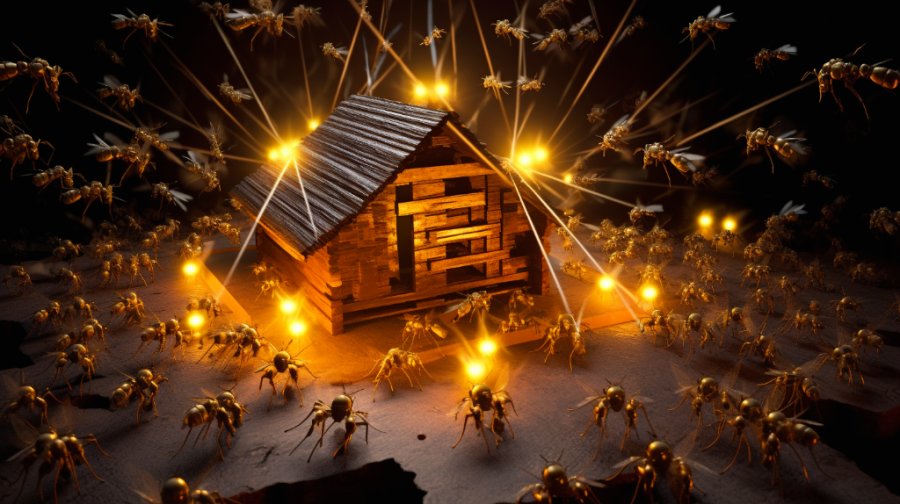Understanding Termites and the Need for Home Remedies

Termites, often referred to as 'silent destroyers', are a homeowner's worst nightmare. These tiny creatures, barely visible to the naked eye, can cause extensive damage to your property if left unchecked. They feed primarily on wood, but also damage paper, books, insulation, and even swimming pool liners and filtration systems. Termites can infest a building for years undetected, slowly eating away at the foundations until significant damage has been done.
While professional pest control services are often the most effective way to eradicate a termite infestation, they can be expensive and use chemicals that some homeowners may prefer to avoid. This is where home remedies come into play. They offer a more natural and cost-effective solution to termite control, although their effectiveness can vary.
Home Remedies for Termite Control

Using Natural Predators
One of the most eco-friendly methods of termite control involves using the termite's natural predators. Certain species of nematodes, a type of parasitic worm, are known to feed on termites. These microscopic worms can be purchased online or at garden supply stores and can be introduced into the termite-infested area. The nematodes will infect the termites, causing them to die within 48 hours.
Another natural predator of termites is the ant. Certain species of ants, such as the Argentine ant and the red imported fire ant, are known to prey on termites. However, using ants for termite control should be approached with caution, as ants can also become pests themselves.
Utilizing Wet Cardboard Traps
A simple and cost-effective home remedy for termite control involves using wet cardboard boxes. Termites are attracted to cellulose, and cardboard boxes are full of it. By wetting the cardboard, you can make it even more appealing to termites. Once the termites have infested the cardboard, it can be removed and burned, thus reducing the termite population. However, this method is not a complete solution and should be used in conjunction with other methods for best results.
Applying Botanical Treatments
Certain botanical compounds have been found to be effective against termites. One such compound is neem oil, a product of the neem tree. Neem oil can be sprayed directly onto termite-infested areas or used to treat wood before construction. It acts as a growth regulator, disrupting the termite's molting process and leading to their death.
Another botanical treatment involves the use of essential oils, such as vetiver oil. This oil has been found to be toxic to termites and can be used as a barrier treatment. By applying the oil around the perimeter of your home, you can deter termites from entering.
Using Diatomaceous Earth
Diatomaceous earth (DE) is a naturally occurring sedimentary rock that has been crushed into a fine powder. It is non-toxic to humans and pets but lethal to termites and other small insects. The powder works by getting onto the termites' exoskeleton and dehydrating them to death. DE can be sprinkled around the house, in the garden, and even inside the walls to kill termites. However, it's important to note that DE only works in dry conditions and may need to be reapplied after rain.
Boric Acid Treatments
Boric acid is a well-known treatment for termite control. It acts as a stomach poison on termites and disrupts their nervous system. Boric acid can be applied directly onto affected areas or mixed with bait such as cardboard or wood. Once the termites ingest the boric acid, they will die. Additionally, termites that have come into contact with boric acid will carry it back to their colony, spreading the poison to other termites.
Precautions and Limitations of Home Remedies

While home remedies can be effective in controlling termites, they are not always a complete solution. Most home remedies are best used for small infestations and as preventative measures. For larger infestations, professional pest control services may be necessary.
It's also important to remember that while these remedies are less toxic to humans and pets than commercial termite treatments, they should still be used with caution. Always follow the manufacturer's instructions when applying treatments and keep them out of reach of children and pets.
Furthermore, termite control can be a complex process, and what works for one species of termite may not work for another. You might be surprised to know how long it takes for termites to destroy a house. Therefore, it's crucial to correctly identify the type of termite you are dealing with before choosing a treatment method.
Frequently Asked Questions About Home Remedies for Termites
Can Vinegar Kill Termites?
One of the most common questions homeowners have is whether vinegar can kill termites. Vinegar is a staple in many households due to its versatility and natural disinfecting properties. However, when it comes to termites, the effectiveness of vinegar is limited. While vinegar can kill individual termites upon contact, it is not effective for treating an entire infestation. This is because vinegar does not have residual effects, meaning it will not continue to kill termites after it has dried.
What Kills Termites Naturally?
There are several natural methods that can kill termites. These include using natural predators like nematodes and ants, setting up wet cardboard traps, applying botanical treatments such as neem oil and vetiver oil, using diatomaceous earth, and treating with boric acid. However, the effectiveness of these methods can vary, and they are often best used as part of an integrated pest management approach.
How to Get Rid of Termites Permanently at Home?
Getting rid of termites permanently at home requires a comprehensive approach. This includes using a combination of home remedies, professional pest control services if necessary, and taking preventative measures to keep termites from returning. Preventative measures can include reducing moisture in and around your home, sealing cracks and crevices in your home's foundation, and regularly inspecting your home for signs of termite activity.
Does Bitumen Paint Stop Termites?
Bitumen paint is often used as a protective coating due to its water-resistant properties. While it can provide a degree of protection against termites by creating a physical barrier, bitumen paint is not a complete solution for termite control. Termites are capable of bypassing this barrier by finding untreated areas or by building their mud tubes over it. Therefore, while bitumen paint can be part of your termite prevention strategy, it should not be relied upon as the sole method of termite control. Always consider a comprehensive approach that includes regular inspections, reducing moisture, sealing cracks and crevices, and professional help when necessary.
Does Salt Kill Termites?
Salt is another home remedy that some people believe can kill termites. The theory is that salt can dehydrate termites in a similar way to diatomaceous earth. However, there is limited scientific evidence to support the effectiveness of salt for termite control. While salt may kill individual termites upon contact, it is unlikely to be effective for treating an entire infestation.
Tips for Preventing Termite Infestations

While home remedies can be effective in controlling termites, prevention is always the best strategy. Here are some tips to help you prevent termite infestations in your home.
Regular Inspections
Regular inspections are crucial for preventing termite infestations. Look for signs of termite activity, such as mud tubes on walls, hollow-sounding wood, and discarded wings from termite swarmers. If you notice any of these signs, it's important to take action immediately to prevent further damage.
Reduce Moisture
Termites are attracted to moisture, so it's important to reduce moisture levels in and around your home. This can be done by fixing leaky faucets, ensuring your home has proper drainage, and using dehumidifiers in damp areas of your home.
Seal Cracks and Crevices
Termites can enter your home through tiny cracks and crevices in the foundation. Sealing these entry points can help prevent termites from getting into your home. Use a high-quality sealant or caulk to seal any cracks or crevices in your home's foundation, around windows, and in the roof.
Maintain Your Yard
Your yard can also attract termites. Woodpiles, dead trees, and mulch can provide termites with the food and moisture they need to survive. Keep woodpiles away from your home and remove dead trees and stumps from your yard. If you use mulch, make sure it's not in direct contact with your home's foundation.
The Importance of Professional Help
While home remedies can be effective for small termite infestations, they may not be enough for larger infestations or for certain species of termites. In these cases, professional pest control services may be necessary.
Professional pest control technicians have the training and experience to effectively deal with termite infestations. They can correctly identify the species of termite, determine the extent of the infestation, and choose the most effective treatment method. They also have access to professional-grade termite treatments that may be more effective than home remedies.
While professional pest control services can be expensive, the cost is often worth it when you consider the damage that termites can cause. By investing in professional termite control, you can protect your home and save money in the long run.
Conclusion
Termites are a serious threat to homeowners, causing billions of dollars in damage each year. While home remedies can be a cost-effective and eco-friendly way to deal with small termite infestations, they are not always a complete solution. Regular inspections, preventative measures, and professional help when necessary are all crucial for keeping your home termite-free. By understanding the different home remedies available and their limitations, you can make an informed decision about the best way to protect your home from these destructive pests.
More to Read:
Previous Posts:




